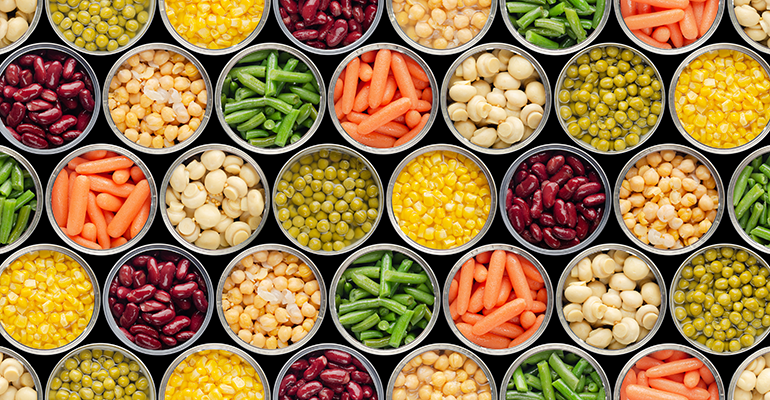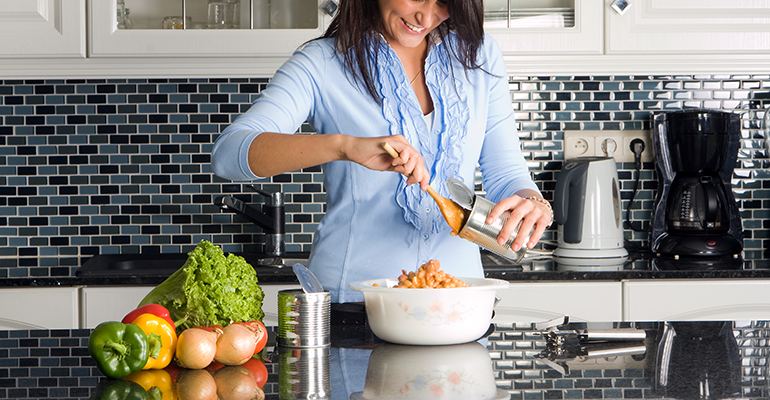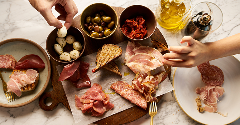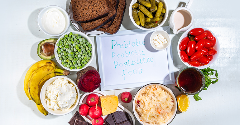News
Full of beans: Innovating in the tinned food category
27 Sep 2022
The tinned food category is known for delivering pantry staples at a budget price – but tinned food startups are innovating with new flavours and meal formats, such as harissa lemon chickpeas and apricot glazed baked beans.
In an age where the food industry is innovating with new flavours and ingredients, the tinned, or canned, category appears staid and stagnant in comparison.

However, the category is looking to experiment with new products and flavours.
“There is growing recognition that canned food offer products that are out of season or harder to source for some recipes – particularly vegan – so the canned food aisle is exactly the place to go for exciting and different foods,” explains Robert Fell, CEO of industry group Canned Foods (CFUK).
“In economically challenging times consumers have historically turned to canned food as a comparatively inexpensive and convenient food source.
Social media reach
In efforts to innovate within the category and appeal to a younger demographic, CFUK recently teamed up with food writer and blogger, Jack Monroe to feature six new recipes that showcase the versatility of canned foods.
The #CannyJack campaign also made each recipe available on the Canned Food UK website as part of its regular ‘Recipe of the Month’ feature.
In other initiatives, CFUK also worked with MasterChef finalists Billy Wright and Jack Layer to develop dinner party and vegan recipes to show canned foods could make out of season or harder to source ingredients available all year round.
“We hadn’t really explored the variety of canned produce available much beyond tinned tomatoes and beans on toast!” the two chefs said. “Would we be able to produce the sort of food we love to cook? Thankfully, the answer was a resounding yes.
“The huge variety of different products available, from vegetables to pulses to caramel gave us loads of inspiration for ways to use canned foods in new, exciting and delicious ways. And as the food is cooked in the can it’s both nutritious and keeps its flavour.”
Startup innovation from Heyday Canning Co and Freshé
At first glance, the partnerships suggest the category’s best chances of bringing something new to the category lies in the canned food’s versatility in recipes as well as its year-round availability.
The approach is astute especially as the cost-of-living crisis bites and consumers are looking to stetch the pennies whilst enjoying tasty home-cooked meals.
For startups like Heyday Canning Co, the tinned food form was an opportunity to place taste at the top of the agenda, emphasising flavour and quality to a new modern generation.
Based in California, Heyday has launched a range of sauce-simmered canned beans designed to go with staples such as rice, pasta or vegetables.
The six flavours, Harissa Lemon Chickpeas, Kimchi Sesame Navy Beans, Coconut Curry Chickpeas, Tomato alla Vodka Cannellini Beans, Enchilada Black Beans and Apricot Glazed Baked Bean are expected to make their debut at Sprouts stores nationwide in November.
“The fundamental value proposition of canned food is really strong and it still feels relevant to a modern consumer,” says co-founder Kat Kavner. “It’s convenient and affordable with really high household penetration.”
Other startups in this space include another US-based firm Freshé, which in 2018, set out to reinvent familiar fish proteins like tuna and salmon into nutritious and tasty tinned meals on-the-go.
Explaining their inspiration, the firm’s co-founders Henry and Lisa Lovejoy said, “The more exciting discovery was a centuries-old European tradition of preserving premium-quality food in tins.”
“We began to experiment,” the husband-and-wife team added. “Beginning with responsibly sourced proteins, we designed traditional, globally inspired recipes filled with wholesome vegetables, legumes, vibrant herbs, spices, and olive oil.”
 © AdobeStock/Anneke
© AdobeStock/Anneke
Many consumers associate tinned food with lower quality
So, is there room for true reinvention in the canned food category? First, the category must fight stereotypes regarding the quality of food. According to research conducted by packaging firm Amcor, 33% of UK consumers and 25% of Spanish consumers think canned food is low quality.
Peel-Off-Ends (rather than cans or tins that must be opened using a tin opener) were perceived to be a sign of a higher quality product, presenting an interesting opportunity for brands to modernise their packaging.
“The opportunities for cans are limitless, and the can outer is open to all sorts of creative treatments,” said Fell.
“The beverage sector has developed some innovative designs which showcase what can be done and there’s no reason why such graphic design treatments cannot be extended further to food cans.”
Fell added that canned food has many strengths – long shelf life which contributes to waste reduction, but its greatest strength is perhaps its sustainability.
“Metal can be recycled over and over again with no loss of quality and has among the highest recycling rates of all packaging materials.
“Younger generations are, I would suggest, more aware and attuned to sustainability attributes and the need to reduce food waste than their predecessors, and in these respects the can is an obvious choice.”
Related news

Oat Barista: Innovation for game-changing beverages
20 Nov 2025
Oat Barista is a clean label, sustainable, and innovative drink base specifically designed to create the perfect foam in one single ingredient.
Read more
Nitrites: Pressure grows on UK to follow EU’s lead
20 Nov 2025
Pressure is growing on the UK to follow the EU’s lead after the bloc revised its regulations on the permitted levels of nitrites and nitrates in cured meats.
Read more
Empowering innovation in fortification and colouration
13 Nov 2025
Divi’s Nutraceuticals offers a large portfolio of innovative, high-quality ingredients for foods, beverages, and supplements, with bespoke solutions and expert support for product success.
Read more
Danone highlights digestive health as potential ‘tipping point’ for food industry
13 Nov 2025
Danone is betting on a food industry “tipping point” that will bloat the market for healthy products, particularly those related to gut health.
Read more
Standing Ovation and Bel scale up casein production from dairy co-products
11 Nov 2025
Foodtech company Standing Ovation has partnered with cheese specialist Bel Group to manufacture dairy serums for industrial-scale casein production via precision fermentation.
Read more
AI attraction means foodtech startups must ‘prove’ rather than ‘promise’
4 Nov 2025
Reports suggest that artificial intelligence (AI) is sucking investment from foodtech and agritech, but investors say the picture is complicated.
Read more
Will postbiotics become the go-to functional ingredient?
3 Nov 2025
Postbiotics show significant promise for the functional foods market due to their safety profile and beneficial bioactive properties, research suggests.
Read more
Meet the finalists of the Fi Europe Innovation Awards 2025
31 Oct 2025
Who made it to the shortlist of the Fi Europe Innovation Awards 2025? Read about the 23 companies making food and drink products healthier and manufacturing processes more efficient.
Read more
Penguin and Club bars no longer classed as chocolate
30 Oct 2025
Penguin and Club bars can no longer be classified as chocolate after the pladis-owned McVitie’s brands turned to cheaper alternatives amid the ongoing cocoa crisis.
Read more
Shorter drying time, sweeter success!
30 Oct 2025
Curious about cost-effective, sustainable and delicious candy making? Stefan Wessel reveals how Avebe’s solutions reduce drying time and energy use by up to 50%.
Read more